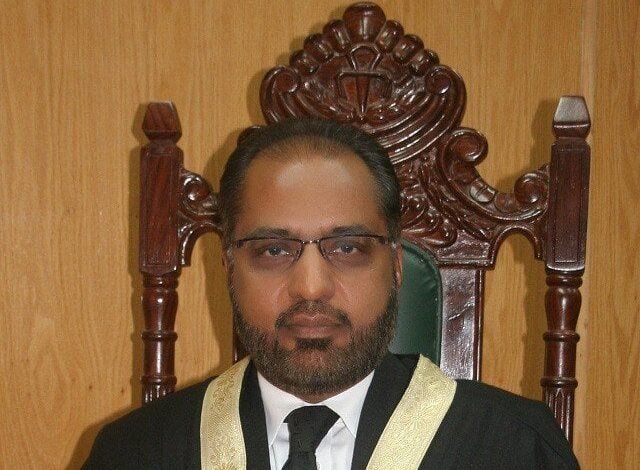
ISLAMABAD:
The Supreme Court (SC) set aside on Friday the Supreme Judicial Council’s (SJC) decision to dismiss from service ex-Islamabad High Court (IHC) judge Shaukat Aziz Siddiqui for a speech in which he claimed that judicial proceedings were being manipulated by the Inter-Services Intelligence (ISI) agency in the Panama case.
In a 23-page written order, authored by Chief Justice of Pakistan Qazi Faez Isa, the apex court noted, “The SJC’s Report/Opinion, dated 11 October 2018, which was submitted to the President and the Notification No. F.9(2)/2018-A.II, dated 11 October 2018, stated to have been issued on the advice of the Prime Minister and his Cabinet of Ministers are set aside. Consequently, Justice Siddiqui shall be deemed to have retired as a Judge of the Islamabad High Court and he will be entitled to receive all the benefits and privileges due to a retired Judge, by allowing these petitions in the above terms.”
Siddiqui had challenged his removal. The plea was heard by a five-judge larger bench headed by CJP Isa and comprising Justice Amin-ud-Din Khan, Justice Jamal Khan Mandokhail, Justice Syed Hasan Azhar Rizvi, and Justice Irfan Saadat Khan.
The court regretted the delay in the case being heard and subsequently decided that Justice Siddiqui attained the age of sixty-two years in the interregnum – the age at which a judge of the high court retires. “Therefore, Justice Siddiqui cannot be restored to the position of Judge,” the SC noted.
It further maintained that “Justice Siddiqui had undoubtedly levelled very serious allegations against General Faiz Hameed, who was then serving in the Inter Services Intelligence (‘ISI’), and a few of his subordinates in the ISI who he accused of manipulation of certain sensitive cases in the Islamabad High Court and in the Accountability Court, which was under the jurisdiction of the Islamabad High Court. However, Justice Siddiqui was not given an opportunity to establish his allegations nor brought face to face with those he had accused. When we noted this lapse we issued notices to all those against whom he made allegations and provided them with an opportunity to admit/deny them. All of them have denied their stated involvement.
“Therefore, it was all the more necessary for the SJC to have inquired into the matter and to have determined who was telling the truth. The SJC did not give any credence to Justice Siddiqui’s own words and to the contents of his replies; the SJC assumed that they were false; and having made this assumption concluded that Justice Siddiqui was guilty of misconduct. It would be difficult to categorize such a determination as fair or one which accorded with the requirements of due process. Justice Siddiqui was not given an opportunity to establish the veracity of his allegations, which was incumbent on the SJC when the same formed the basis of Justice Siddiqui’s removal from office. The Fundamental Rights enshrined in the Constitution include the right to a fair trial and due process (Article 10A) and all citizens, including Judges, must be dealt with in accordance therewith. However, Justice Siddiqui was deprived of his Fundamental Rights of fair trial and due process. Article 209 does not stipulate that in determining whether a Judge is guilty of misconduct he is denuded of the Fundamental Rights nor permits the SJC to act contrarily to them.”
Read Ex-DG ISI summoned in IHC judge removal case
The written order further stated, “In all prior cases when proceedings were initiated against Judges which resulted in their removal from office it was done after the recording of evidence. Evidence was recorded in the case of Justice Akhlaque Hussain before rendering the opinion that he should be removed from his office. In the case of Justice Shaukat Ali the SJC recorded evidence of witnesses before formulating its opinion and recommending his removal. And, in the recent case of Mr. Mazahar Ali Akbar Naqvi the SJC recorded the testimony of 14 witnesses, who produced a number of documents, opportunity to cross-examine the witnesses was granted, and only then did the SJC find that Mr. Mazahar Ali Akbar Naqvi was guilty of misconduct and should have been removed as a Judge of the Supreme Court.”
“The Code of Conduct issued by the SJC does not prohibit a judge from addressing a bar association or even a public gathering, neither does any law. The SJC without ascertaining the veracity of the allegations, and without conducting an inquiry, had determined that Justice Siddiqui was guilty of misconduct merely because he had taken the matter public. If all that Justice Siddiqui alleged was true then it would be unjust and unfair to punish him for highlighting wrongdoing at the highest level. But, if on the other hand what he had alleged was found to be false then he would be guilty of misconduct. The allegations were serious and their veracity should have been ascertained, which is also what the Chief of Army Staff and the Government of Pakistan had explicitly requested. Unless the law governing an individual prohibits disclosure, telling the truth is never made punishable,” the court stated.
Justice Siddiqui’s dismissal
On October 11, 2018, former president Arif Alvi notified the removal of Justice Siddiqui as a judge of the IHC on the recommendation of the SJC.
The president took the decision under Article 209(5) on the SJC recommendation under Article 209(6) read with Article 48(1) of the Constitution, a notification issued by the Ministry of Law and Justice stated.
The council unanimously opined that while delivering the speech before the District Bar Association in Rawalpindi on July 21, 2018 Justice Shaukat Aziz Siddiqui, an IHC judge, displayed a conduct unbecoming of a high court judge.
Terming Siddiqui of guilty of misconduct, it stated that therefore, he was liable to be removed from his office under Article 209 (6) of the Constitution.
This was the opinion of the five members of the SJC, led by Chief Justice of Pakistan Mian Saqib Nisar.




